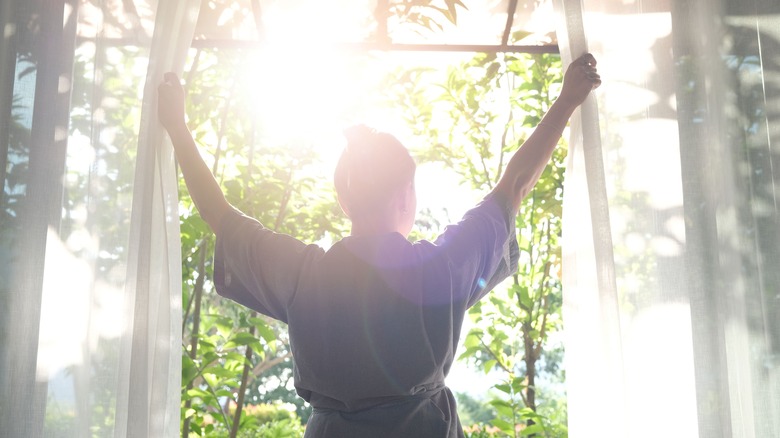The Easiest Way To Achieve A Better Smelling Home Without Spending A Dime
If you search the internet for ways to improve the smell of your home, you'll likely be faced with a myriad of products that will prey on your desperation and promise fantastic results for a pretty penny. While there are many products on the market that can make your home smell amazing, there is an entirely natural way to achieve a better smelling home and it won't cost any money: opening your windows.
Bad smells in the home are caused by lots of things: trips to the bathroom, pet odors, a conglomeration of kitchen smells, and daily goings-on, all of which can contribute to a funky smell in your home. Moisture levels in the home also are closely related to the musty scent of home sweet home, as bacteria thrives in moist environments — resulting in gross smells. Fortunately, opening your home to outdoor air can radically reduce the amount of bad odors in your home. On top of that, ventilation — such as an open window — has been shown to have a significant impact on reducing bacteria growth.
How do open windows improve the air?
In addition to making your home smell better, opening windows can actually reduce levels of carbon dioxide inside, which has been studied and linked to improved sleep quality in healthy individuals. As windows are closed for long periods of time, carbon dioxide levels begin to build up inside the home (a 2015 study on natural ventilation methods found that a closed-window space overnight experienced CO2 levels of 1752 ppm). This puts a room with a closed window from 11 p.m. to 7 a.m. in the same bracket of air quality associated with the physical symptom of drowsiness and a perception of poor air.
Like carbon dioxide concentration, virus levels can also accumulate indoors when windows are kept closed all day. By opening the windows, you force the unhealthy air particles outdoors and invite fresh ones in to take their place. If you live in an especially humid part of the country, opening the windows to let in some fresh air could be a double-edged sword: open windows could allow more moisture to come indoors and lead to increased chances of bacterial growth. In that case, you should run a dehumidifier in your house to help improve indoor air quality, while limiting the accumulation of excessive moisture from an open window. These appliances are available at every price point and make the space less-conducive to bacteria growth by extracting moisture particles from the air.
Keeping open windows cost-effective
If you are concerned about the energy costs of such a habit during the frigid months of the year, a quick field trip to Europe may prove enlightening. In Germany, the practice of "shock ventilation" has been promoted by the government. It involves opening all of the home's windows for a limited amount of time (usually 2-5 minutes) throughout winter, and up to several times a day. This practice has been found to be far more energy efficient than cracking your windows open in the winter for longer; a short period of fully open windows replaces stale air with fresh, without causing the entire home — furniture, floors, and everything else — to cool down significantly and require excessive energy costs to reheat it all.
German homes that practice shock ventilation in the winter spend roughly $45 in additional energy costs during the winter, versus keeping windows continually cracked, which costs about $280. If your energy budget has a little wiggle room in it, experimenting with shock ventilation could make a big difference on your home's indoor air quality. The same principles could be applied to homes in hot locations during the summer by briefly opening all the windows to freshen the stale HVAC air. While you may not be able to throw open your windows all day, you can likely find a few minutes during most of the year to air out your home and reap the benefits.


